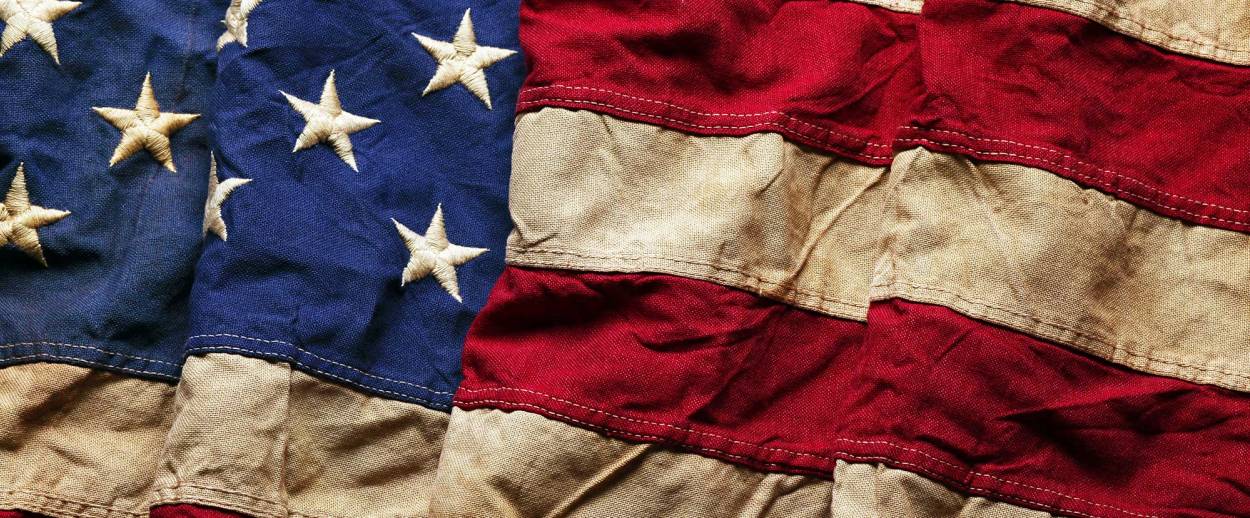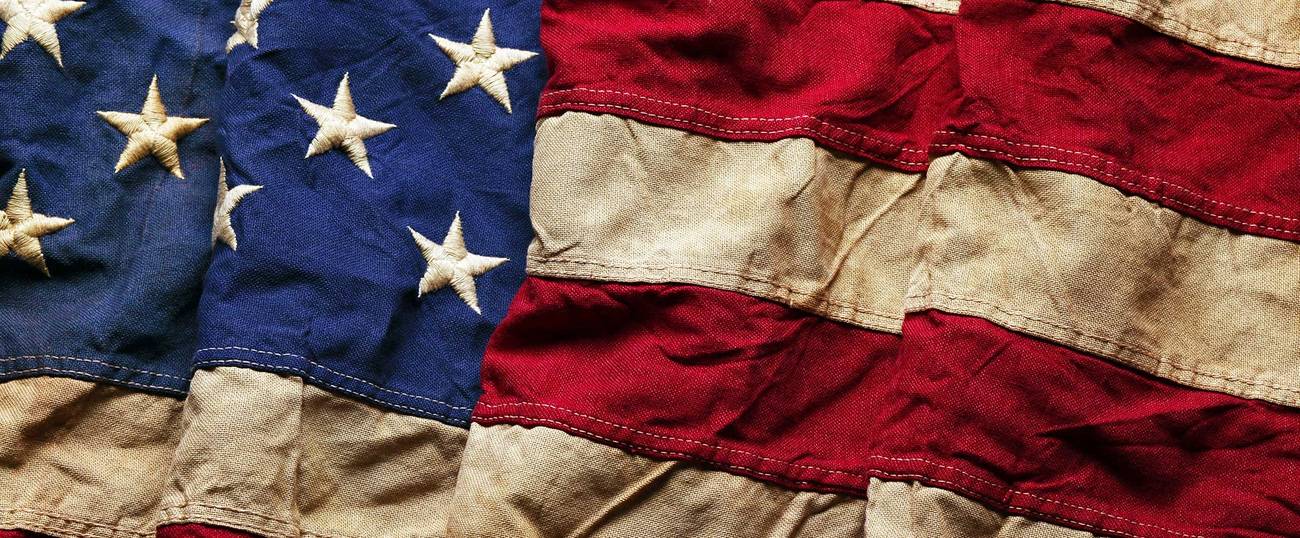When Granny Beat Back the Klan, Armed With an American Flag and a Frying Pan
With an American flag in her hand, my immigrant grandmother stood up to a gang of Texas roughnecks




My mother worshipped her mother, Yetta Wachstein Hochman, even more than she worshipped me. While that left me as a runner-up, I still liked my grandmother’s visits in the 1940s, when I was a boy in Houston. Even my little dog did. When my grandmother walked haltingly up the stairs, grasping the railing with both hands, the dog kept two steps behind her, as if poised to catch her if she fell.
Every year as July 4 approaches, I have an image in my mind of Granny defiantly holding the American flag high in a small Texas town one afternoon. I wasn’t there to see it, but she told me what happened. She was what John Lennon would call a “working-class hero” that day—and always—who knew her own mind and looked after her family in a country and world far different from the one into which she was born. But that’s getting ahead of myself.
I had always associated everything about my grandmother with her European origins. That was, of course, wrong. She was not one to dwell on how wonderful things were in the “old country.” In fact, when someone remarked that they were taking a trip to Europe, she would say out of the side of her mouth, “Big deal. I was born there and I couldn’t wait to leave.” And although she and my grandfather belonged to the Orthodox shul in Galveston, perhaps out of respect for her own father, she saw her Orthodoxy as baggage from Europe and sent her own children to a Reform congregation, which, in her view, offered an environment more in line with the America they had moved to.
When I knew her, my grandmother was in her 70s and looked very old. By then she was only 4 feet 8 inches tall, her body shriveled, her movements labored. At home she wore a housecoat that hung like a muumuu. Her yellowish-gray hair fell below her shoulders and was rarely combed; she put it in a bun when she went out. On those occasions, she wore black leather shoes with thick, wide heels that added perhaps an inch to her height and hose held up to just below her knees by a garter. The only dress I remember was black and fell just below the top of her hose. Although she bathed every day, she had a smell I thought particular to old people because my cousin’s other grandmother had it too. The skin on her face was much less wrinkled than the skin on her body. Her deep blue eyes were youthful—they sparkled when she was happy or joking. When she was angry, she suddenly seemed much taller than she was, and her eyes pierced.
It was hard to believe she was the same person who’d been the bride dressed in the high style of the 1890s in the photo displayed on the mantel in my home. There she wore a high-collared, cinch-waisted white dress with puffy sleeves. Her lovely face exuded the confidence of the young and beautiful.
My grandfather was a hardworking man beset by bad luck. He was killed in a hit-and-run accident on New Year’s Eve and died the next day, Jan. 1, 1929. His life-insurance policy was paid up only to Dec. 31, 1928, and even though the insurance company office received, on that same date, the payment he had mailed in just before he died, they refused to honor it.
My grandparents had met in Savannah. My grandmother had been married before, an arranged marriage. Her husband left her and their young child, my aunt. For two weeks she was too ashamed to leave the house. Finally her family prevailed on her to rejoin the living. She met my grandfather. They married; he adored her. They moved to New York, then Philadelphia. By this time my mother and three of her sisters had been born. In Philadelphia, two more came along.
But my grandfather had a dishonest business partner and lost nearly everything. Disheartened, he went to a steamship company and said, “I have this much money and this many people in my family. How the hell far can I get away from Philadelphia?” The answer: Galveston, Texas. My grandfather opened a jewelry store in Goose Creek, a small town a ferry ride away.
Years later, when I was around 8 years old, my grandmother and I took a Greyhound bus from Houston to what had been Goose Creek before it was merged into the city of Baytown. Granny still had some property there, virtually worthless. I went with her as she made her annual inspection. She bought me a bag of popcorn for the trip from Houston and another for the trip back.
We walked from the bus station. She held her head high, though she seemed to use her left foot to anchor every step she took with her right. The property was a two-story building with a weathered wooden exterior. It had space for three commercial establishments. Two were vacant, and the third was a domino parlor. I remember men sitting at tables on the porch playing dominoes, even though it was mid-afternoon on a work day. They were dressed almost identically—white T-shirts under blue denim overalls, cowboy hats, and well-worn work boots. They were drinking beer and playing dominoes. When one of them made a devastating play, he slammed the domino on the table and yelled. Until then I hadn’t known that grownups played dominoes or that it could be a violent game.
It was because of people like those men that my grandmother’s family moved from Goose Creek to Galveston, which was a gentler place and had Jewish houses of worship. Goose Creek had none. In the late 1910s and early 1920s, my grandmother told me, Goose Creek was an oil boom town. The Ku Klux Klan was present and largely uncontrolled. The catalyst for their move was the tarring and feathering of a black man just down the street from where they lived in Goose Creek.
Once in Galveston, my grandfather began commuting by ferry to Goose Creek, living over the store during the week and returning home on weekends. He did that until he died.
On the bus ride back, I asked my grandmother what it was like living in Goose Creek.
She smiled. “Did I ever tell you about the time I was arrested?”
“No.” My eyes widened.
“When we lived in Goose Creek, it was full of roughnecks.”
“What’s a roughneck?” It was a word that conjured up confusing images, and while I had an approximate idea of what it meant I wanted very much to understand this important family story.
“A roughneck was a rowdy, uneducated man who worked in the oil fields and drank up his paycheck,” she said.
Rowdy, uneducated people who drank, I thought. Bad guys.
“All the roughnecks were members of the Klan,” she said. “Your grandfather was a very respected man in Goose Creek. When he died, the whole town closed. He was a poor man, but very respected.” She meant not only that my grandfather was poor but respected, but also that the whole of Goose Creek was greater than the sum of its roughnecks. The respectable people of the town had the collective decency to recognize with dignity the passing of a hardworking, contributing member of the community.
“Anyway,” she continued, “when the family lived there, the Klan was very powerful. They didn’t like Jews. One day, when your grandfather was away on a buying trip, a group of them started milling around the house and the crowd got bigger and louder. They were drunk. Your mother and her sisters and your uncle, the youngest, were in the house. I didn’t know what would happen if it just went on.
“I’ll tell you what I did. With my left hand, I grabbed the American flag that we kept in the house and grabbed a heavy, cast-iron skillet in my right. Then, I stepped outside. One of the roughnecks was standing on the steps not a foot away. His name was Barbour. He was over 6 feet tall and even standing on one of the lower steps, he was taller than I was. I took that skillet and I hit him on the head as hard as I could, and I knocked him out. I held the flag up as high as I could and I said, ‘I am an American and you are Americans. I have just as many rights as you have. You have the right to say who can be on your property, and I have right to say who can be on my property. Now get the hell off my property or I’ll go inside and get the shotgun.’ ”
I was agog. “Granny, did you have a shotgun?”
“Papa had one. He fired it once a year.”
“Did you know how to use it?”
“No.” Her blue eyes twinkled as she smiled the smile of a triumphantly mischievous young girl. Even to that day, she was enormously proud of her bravado.
“Did they leave?”
“Yes, very quickly and very quietly.”
I wondered what would have happened if they’d called her bluff, but I didn’t mention it.
“Then Barbour filed criminal charges against me. Battery. The trial was in Houston. At the end the judge said, ‘Mrs. Hochman, I am sorry that in these proceedings I only have the power to find you not guilty. I wish I had the authority to give you a medal. You not only defended yourself and your family, as you had every right to do, but you taught us all an important lesson.’ ”
But the story doesn’t end here. I remember that Granny frequently referred to herself as a “brave soldier,” but it wasn’t my impression then or now, some 60 years later, that she called herself that because of her moment against the Klan.
After my grandfather died in 1928, the jewelry store was liquidated, leaving only a few souvenirs for each child to keep. After the traditional period of mourning had passed, no further sadness was allowed in the house. My grandmother went about the business of life for her children and herself. She took in washing. She kept a milk cow in the back yard. One of my mother’s chores was to walk the milk in pails to sell to the dairy, which she did, less her reward, the cost of a pickle, which she ate on the way back.
The people I respect the most are the ones who plow ahead in the face of hardship and accept the responsibilities they have chosen or that have been thrust upon them, rather than the ones who have distinct moments of glory. Society depends upon people like that.
Not one of my grandmother’s children felt herself or himself to have been deprived or short-changed of anything but the loving presence of their father. The only son, the youngest, got a college education and a law degree. All the children grew up to be hardworking, honest, responsible, and socially conscious members of their communities, helping to provide the children of the next generation with the opportunity to reach their aspirations.
I am so proud of that moment in Goose Creek when my grandmother, flag in hand, cold-cocked the roughneck bigot. But I’m even prouder of the years she spent keeping a family together, being a brave soldier.
This article was originally published on July 2, 2010.
Marc Grossberg is a lawyer living in Houston.